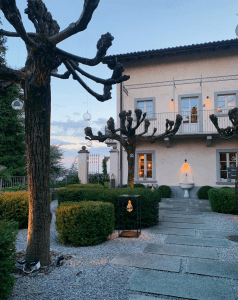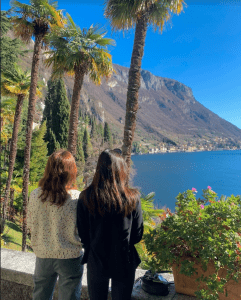Written by Katherine Sanders
My flight from Billings to Dallas was filled with the Navy and Gold of the Montana State Bobcat fans. It was the FCS championship for the beloved Montana football team. They played North Dakota State in Frisco, Texas the next day. Thus, I was met with some familiar faces from high school while walking down the aisle. Flying out of Montana, the cabin was filled with white light. The snow was the best gift I could have received from the holiday season: I hadn’t seen it since the last. My small flight didn’t let me miss my home.

I landed in Dallas at 11:00am. Zach, GTE summer program alumni and one of my closest friends, texted me that his flight from Dallas to Frankfurt was delayed eight hours when he came to GTE. I jokingly replied that I would find a way to spend the time. However, my six-hour layover was already too long.
When my flight was delayed the first time, I was excited to have similar landing times to my friends Maddie and Baran. When it was delayed the second and third time, I could still make the last shuttle provided by GTE. When it was delayed the fourth, fifth, and sixth time, I desperately needed a friend. I scanned the area, convincing myself that I had seen all the nineteen- and twenty-year-olds somewhere around campus. Before I started approaching everyone with “Do you go to Georgia Tech?” I texted the GroupMe to see if anyone would reveal themselves first. Aarush let me know that he was with two others on the same flight. I found Aarush, Manish, and Jacob at our new gate.
I swore a more familiar face walked by. I was determined to find everyone that I could, so I broke away to test my theory – am I delirious, or is that someone I recognize? “Do you go to Georgia Tech?” was met with a yes when I saw Juan just past the gate. He introduced me to Ray who had been waiting in Dallas even longer than I had. The three of us sat at a charging station for an hour finding ways to get to Metz from Paris. I hoped I could figure out European transportation with Maddie and Baran when we planned our first trip in France. Instead, I had to learn in a heavy haze of stress.
I was concerned about my bags. I had two large, 50lb suitcases waiting for me at baggage claim. I wore a long-sleeved top, sweater, and jacket on the plane to save space, but the copious layers created uncomfortable warmth, so I always ended up carrying one or the other. I also had my backpack, filled to the zipper with makeup bags, electronics, and other random items. It was so full it could barely fit under the seat in front of me on my first flight. And for my personal item, a neck pillow from my dad. I was constantly carrying two or more items along with twenty pounds on my back.
Alex, who was arriving in Paris around the same time we were, sent us the information for a train she booked. This led us to ditch the car rental idea and the $500 taxi idea for tickets for the same train. On the SNCF website, we could search for trips from the Charles de Gaulle airport to Metz Ville. The options that came up provided us tickets to trains and connecting buses, so we didn’t have to figure out the connection on our own.
Ray, Juan and I sat on the ground at our oddly small gate when Aarush, Manish and Jacob found us. We all bought a €70 ticket for a 5:30 train and 6:40 bus when priority boarding started. The process was simple–we entered our payment information, and it gave us QR codes that acted as our tickets.
The most exciting part of the plane was the plane meals (sorry Juan). I had never been on a long enough flight to have eaten a meal, and the meals meant we were finally getting closer to Metz, and I was finally out of that airport. Eating the plastic-packaged bread almost brought me to tears.
Immigration only took ten minutes, and getting our bags was calm and simple. The five of us tried to learn French from those around us while Aarush asked why his bag wasn’t at the carousel. It took an hour for support to tell him his bag somehow never made it on the plane (the one we waited more than five hours for). It’s nightmare after nightmare.

Getting our bags onto the train was also nightmarish. We were the last ones entering the car, meaning there was not much room for our belongings. Manish and I attempted to rearrange the bags of French passengers while they stared. Jacob ended up going to the cabin above to find more space. After we got to our seats, I stared blankly ahead without my headphones on to stay aware of the people around me. I was already so embarrassed from before; I wanted to collapse into my seat for the hour long ride. The least I could do was focus on staying silent and still.
We arrived at Lorraine on our toes as we had less than 10 minutes to make the bus to Metz Ville. Rushing out of the car, we were met with a long, cement staircase leading up to the bus stop. I only carried one of my bags up the stairs (thank you Aarush), more than enough to leave me more exhausted than before. Straight through the station was our bus to Metz. Getting our bags into the bus was similar to the train, especially for me. We rearranged existing bags and shuffled around to make sure everything fit (thank you Ray). My legs are still purple with bruises from kneeling on the ground.

The bus ride was the most calming transport of the evening. It was only a quarter full, and it lasted around 40 minutes. The seats were comfortable, and the inside was warm. Getting off the bus, we were placed too far from our dorm to walk but too far out of the city to get distracted by a pleasing view.
The easiest way to get to campus was an Uber. We knew that our bags might cause issues, so Aarush called the first Uber while we decided who would go where. The first Uber came, a Tesla, and the driver arranged the bags inefficiently in the trunk. This left Manish with his small suitcase at his feet in the front seat while Aarush and I sat in the back with our backpacks in our laps and two carry-ons in between us. One of my suitcases was in the car, but the other was left behind with the others. We awed at the purple streetlights and the French architecture of the street side buildings during our ride.
In front of the Lafayette dorms, I was slightly more grateful for the journey than annoyed. I learned a lot about European transportation before crossing the ocean, and I made great friends along the way.

















 As the sun rose high in the sky, I was delighted to feel the warm rays bathed across my face and the fresh breeze. It was a definite change up from the weather in Metz, where it was perpetually grey and gloomy seven days a week. The city itself was beautiful. The town was lined with colorful houses of pastel orange, yellow, and red. The small little alleyways of the quaint Italian town seemed to emerge from stone, stacked upon each other creating small winding trails on the cliffs above the water, which shimmered a beautiful crystal-turquoise color as small private boats settled on the surface, rocking peacefully back and forth. Although the trees were still on their early spring phase, the leaf-less branches created intricate shapes and patterns that weaved higher in the sky, a natural masterpiece.
As the sun rose high in the sky, I was delighted to feel the warm rays bathed across my face and the fresh breeze. It was a definite change up from the weather in Metz, where it was perpetually grey and gloomy seven days a week. The city itself was beautiful. The town was lined with colorful houses of pastel orange, yellow, and red. The small little alleyways of the quaint Italian town seemed to emerge from stone, stacked upon each other creating small winding trails on the cliffs above the water, which shimmered a beautiful crystal-turquoise color as small private boats settled on the surface, rocking peacefully back and forth. Although the trees were still on their early spring phase, the leaf-less branches created intricate shapes and patterns that weaved higher in the sky, a natural masterpiece. 
 Finally, in Bellagio, we hopped off the ferry right on time to catch the glorious sunset, a ball of bright red that dipped below the horizon. As the sun disappeared, the cold started to set in, coupled with the strong winds that ripped our hair back and forth. As we took a look at the time, we would be right on time to catch the last bus back to the train station in Varenna, which would bring us back to the hotel. We stood in the dark corner of the bus station, waiting as the time ticked past its scheduled arrival. As the moon continued to rise higher into the sky, the bus finally showed up, only to be packed to the BRIM with passengers huddled like sardines on board. There was no room to spare. The driver, however, didn’t even stop; instead, we took one look at our shivering selves at the bus station, shrugged, and sped away. Our hearts sank. There was no way back. We stood there in silence for a minute pondering on what to do, but not too far from the dock, we saw a ferry pulling up to the station. It seemed to be running on schedule despite the strike. At once, we bolted on board only to find twenty other people trying to get to the same train station to catch the next train that would supposedly leave 5 minutes after the ferry arrives.
Finally, in Bellagio, we hopped off the ferry right on time to catch the glorious sunset, a ball of bright red that dipped below the horizon. As the sun disappeared, the cold started to set in, coupled with the strong winds that ripped our hair back and forth. As we took a look at the time, we would be right on time to catch the last bus back to the train station in Varenna, which would bring us back to the hotel. We stood in the dark corner of the bus station, waiting as the time ticked past its scheduled arrival. As the moon continued to rise higher into the sky, the bus finally showed up, only to be packed to the BRIM with passengers huddled like sardines on board. There was no room to spare. The driver, however, didn’t even stop; instead, we took one look at our shivering selves at the bus station, shrugged, and sped away. Our hearts sank. There was no way back. We stood there in silence for a minute pondering on what to do, but not too far from the dock, we saw a ferry pulling up to the station. It seemed to be running on schedule despite the strike. At once, we bolted on board only to find twenty other people trying to get to the same train station to catch the next train that would supposedly leave 5 minutes after the ferry arrives.